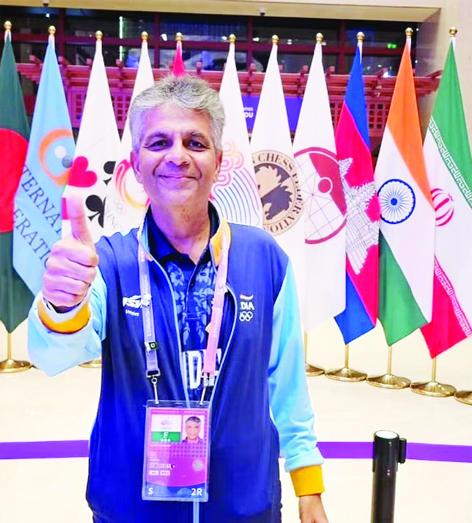Harihar Swarup
Jaggy Shivdasani, 65, was the oldest Indian medallist at the Asian games in Hangzhou, where he and his team won a silver in bridge. He was also the youngest Indian champion: he set that unbroken record at the age of 18, winning the Holkar Trophy in 1976.
Shivdasani has won all the national titles multiple times and represented India in numerous international events. In 1987, he became the first non-American ever to win one of the three major North American team events: the Spingold knockout Teams.
“Bridge requires technical skills, the ability to read your opponents, hand evaluation, maths, statistics and probability, as well as stamina and nerves”, he says. In an interview to IPA, he says-
Q. Anju Bobby George of the Athletics Federation of India said the Chinese tried to cheat India of medals. Javlin champion Neeraj Chopra said his first throw was not recorded. What has been your experience?
A. We didn’t have any such experience. The Chinese were more than nice; they played absolutely fair. We beat China in the semifinals. They were one of the favourites and were very, warm about their congratulations.
Q. Why did you stay outside the village? Were the facilities inside the village inadequate or the rules too rigid?
A. The facilities were top class. But they had these five-bed-apartments with only three bathrooms for eight people and I couldn’t manage with that, even though I would have had a single room. That is why I chose to stay in a hotel. It was just two metro train stops to the playing area, and another two stops to the village.
The security was very tight in the village, and it was also nice for me to be in my own world, and see the city a bit.
Q. What are your impressions of Hanzhou, the city and the people?
A. The city was brilliant. Every street, which could be a smaller road, had four lanes on either side and a separate lane for bicycles and a separate lane for walking. People are so disciplined, and no car or pedestrian will cross on a red light. There are security cameras everywhere. You can leave a bag of dollar 100,000 anywhere in the city or on the metro, and no one will dare touch it. There was no crime. They are, at least, 20 or 25 years ahead of India in terms of infrastructure.
Q. How did you get interested in bridges?
A. It is quite an interesting story. Obviously, I had some innate ability because my father, Bhagwan Shivdasani, was a national champion. But I got exposed as a young teenager through my cousins, Then I started learning by watching and reading. My father had retired from playing, but he came back to play the nationals with me, which he had not played for eight years. And we, as father and son, won the nationals in 1976. I was 18 years old and I was youngest. And 47 years later, that record has not been broken.
After I started playing for India, I met for the first time in Calcutta one of the biggest superstars of bridge, Zia Mahmood, who is a Pakistani. We became friends. Actually, we met him in an invitation to a world event which took place in Calcutta in 1982. “You are wasting your time in India,” he said. “You should travel abroad , and you can really blossom.” (IPA)
Trending Now
E-Paper


